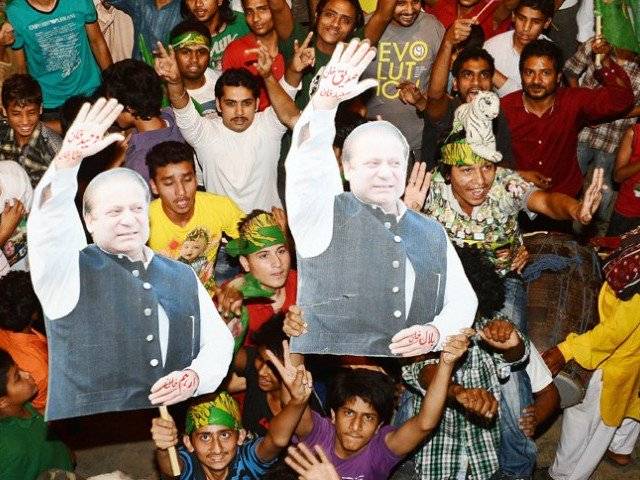The turnout in general elections of Pakistan has been unsatisfactory. It was least in 1997 with 35% and maximum in 2013 with 55%. Youth’s turnout in elections was even low. One major reason of low turnout is that rigged elections have become a norm in Pakistan and that is why youth’s belief in the political system shattered. Those who were born in early nineties, they have witnessed terrorism, inflation and political instability when they reached to the age of casting their votes. During Pervaiz Musharaf’s rule, ban on political activities in universities and no comprehensive policy on campus leadership programmes also led youth to stay at distance from political realities of Pakistan. Despite all this, youth played a significant role in elections and it has exponentially increased in the last decade. In 2008, when democracy took its flight after a long span of nine years, the youth started participating in politics. It was, however after 2011, when the balance of powers was jolted by PTI that gave birth to a new generation with its rhetoric of youth. Once again the political awakening was seen in universities but it was another kind of campus politics that was proliferated and managed through the social media rather than being involved in mainstream politics like Islami Jamiat and People Students Federation (PSF) used to do.
In today’s political landscape, youth apparently is more informative and connected to the political happenings in Pakistan still they couldn’t contribute productively. It is due to the fact that culture of grooming young worker and voter by political parties is in shambles. There hasn’t been a defined and robust culture of a democratic nurturing of youth existed in political parties. Resultantly, parties couldn’t translate the mammoth crowd of youngsters in their jalsas into a confirm vote bank on the day of polling. Another reason is the presence of youth on social media rather than on real grounds. On social media, the level of debate and argumentation between youth of different parties is frivolous. This is yet another ghastly image of our collective national intellect. It is true that PTI brought educated youth to political arena but it is equally a stark reality that it has done nothing tangible to inculcate the democratic ethos and obligations in them. This stands true for rest of the political parties too as they suffer the same dilemma.
Today, as we witness the blend of advance technology with politics, we also observe that lack of proper grooming of youth by political parties has traumatized the social fabric. The social media teams – run by youth from different universities – of all the political parties are badly tangled in defending their parent parties with irrational boastings and offending other political parties with abusive language. Not even a single thread of logical debate or argumentation have been observed on Twitter and Facebook from any social media team. The war of slanderous words after Avenfield decision on social media reached to another pinnacle which truly depicts that no ethical trainings are given to youth that run social media teams of political parties. Youth as it proclaims itself the next driving force of Pakistani politics is crippled in derogatory language to satiate their affiliations for a particular political party. It is the core responsibility of political parties to groom their young workers and voters with democratic norms as they will be the future face of their parties. It should be precisely realized that casting a vote is more important than defending political affiliations on social media with derisive comments. If youth, instead of defending their political parties on social media, comes out of their comfort zones and cast vote, it will not only improve the voter turnout but also validate their democratic obligations as citizens.
With the flip of coin, the other side needs our attention too. Is youth studying in colleges and universities the only participator in elections and have political awakening? There is another huge segment of youth that is not present on social media, studies in seminaries, and has been a connected part and a voter of right wing and ultra-right wing religious parties since long ago. This segment of youth in our society has been neglected whenever youth policy was formulated or youth’s role in politics was discussed. Sadly, they haven’t been in the discussion of progressive and left wing political parties. They had have no ample options to express their political aspirations and alienations. No political party from left wing ever tried to include the youth of seminaries in their plans and projects. By large, had any political party championed youth on its agenda, it simply meant the youth studying in colleges and universities who could be allured through perks like laptops, scholarships, research opportunities and jobs. There should have been a pragmatic policy of including youth of seminaries in the main stream politics. But unfortunately, they never have been a part of any manifesto. A focus should be given by political parties to these neglected segments of our youth. If properly channelized, their vote will put a considerable impact on overall turn out in 2018 elections.
Once again, the general elections are about to arrive and youth is being termed as a major influencer on election results. This election will be a watershed moment to decide the future of this country as 46 million youth is a registered voter out of total 105 million voters. The onus lies on political parties as how they utilize and mobilize this huge vote bank. Translating social media support to attract them for polling is not an easy battle that mainstream political parties have to fight. If successful, it will certainly increase the voter turnout this time. Otherwise, the youth’s support only on social media will impart no good results on general elections and to democracy as well. Moreover, left wing political parties need to go towards inclusivity rather than exclusivity when it comes to the youth studying in seminaries or barely educated.






